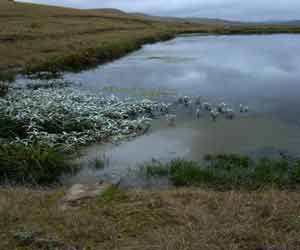

Organic waste treatment efficiencies are both temperature and
seasonally dependent. During the warm season, mesophilic microbes build
up a beneficial biomass, but as temperatures decrease so to do the rates
of biochemical reactions. In addition, it is well known that microbes
slow their metabolic activities as temperatures drop.
CWT100 was developed to restore microbiological degradation to waste
treatment plants during the cold winter months. The product is a
combination of specifically isolated psychrophilic (cold loving) strains
of bacteria that exhibit growth and metabolic activity at a temperature
range of between 1 oC – 15 oC.
The cryophiles have developed small structural changes to enable them
to survive and prosper. They have adapted their cell membrane to
withstand extremely cold environments and produce cold active enzymes to
help in the conversion of their organic food source.
Applications
- Augment the biomass in waste treatment
biological reactors in the cold winter months ensuring the plant meets
critical discharge limits.
- Waste treatment facilities in temperate regions
can reduce the impact of large seasonal changes on their plant
efficiency.
- Aerobic lagoon systems that experience
difficulty in building enough indigenous biomass for efficient
treatment due to cold weather operation.
- Waste treatment plants that are finding it
difficult to meet ammonia discharge limits caused by the impact of
cold weather on microbial nitrogen removal.
- Psychrophilic digestion of liquid animal manure
and composting systems.
- Degradation of kitchen waste and refuse in cold
environments.
- Cold weather systems start up or upset recovery.
Benefits
- Improved suspended solid and dissolved organic
carbon removal during the winter months.
- Bio-augmentation in cold weather conditions
where normal biomass is unable to reduce the organic load due to their
slowed metabolism.
- Enhance cold temperature nitrification and
improve ammonia (NH3) discharge results during the cold
season.
- Return sewage plant effluent quality back to
acceptable discharge limits during the cold winter months.
- Ensure that aerobic lagoons remain effective
when temperatures drop.
- Cold water BOD/COD reduction.